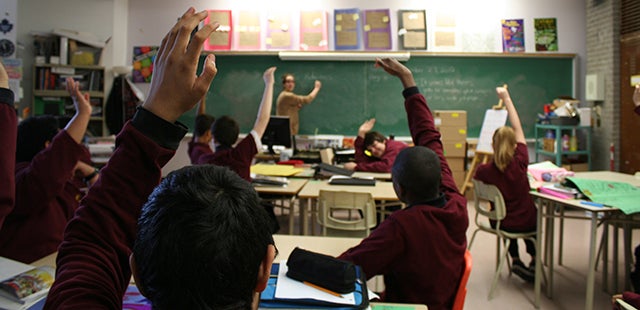EMSB Program Reduces Disruptive Class Behaviour

Stephanie Paquette is a behaviour management specialist. She fields requests from school administrators who need the help of Project Harbour, a program designed to support teachers, students,
Ms. Paquette said the program was launched some 20 years ago because, "teachers were having some challenges with children who had behavioural difficulties, social, emotional, in the classrooms. The program was used to support these teachers and also behaviour technicians or other staff working in
The program is also used to help teachers become more successful with classroom management. Project Harbour behaviour technicians assist the teacher is creating systems to help the students become organized, focused and attentive.
Not all, but, some of the children Ms. Paquette and her team
When Ms. Paquette, who has a Masters Degree in Social Work, gets a request, "I go and observe or do interventions one-on-one with the child. A lot of the work is with the behaviour technicians and with the teachers as well...We're there for about three weeks. And we try to implement as many strategies and interventions as we can in order to help the classroom function normally."
One strategy that Ms. Paquette promotes, is encouraging teachers to greet their students at the classroom door when they arrive in the morning. "I think it gives the teacher a good idea, a good indication, of how that child is feeling...They're very quickly going to see if a child looks more
Teachers can use preferential seating for a disruptive student; seating the child closer to the teacher as opposed to with other students.
Another strategy involves including the child in a 'leadership' or 'helper' role. "That can really be useful," Ms. Paquette said. It can boost their confidence or self-esteem.
Something that shouldn't be overlooked is communication with students.
Ms. Paquette points out as well that she likes to involve parents as much as possible, to work as a team. She and others within Project Harbour try to take into account the family context that could affect a child's behaviour. There could be many factors such as health and family finances.
Something that shouldn't be overlooked is communication with students.
"You can follow
The Project Harbour Coordinator knows full well the pressure that students face these days because of social media. "Yes, there are these pressures. Yes, teenagers are experiencing them. But, as parents and educators, I think we need to go to the source, we need to go to the teenagers to understand, 'What are these apps that are out there? What is it that you experienced or that you've seen from your peers?' It is imperative for us to create relationships with youth to give us a better understanding of how we can be helpful."








